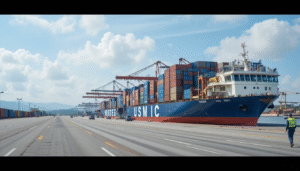Dubai stands at the crossroads of global trade, connecting markets across Asia, Europe, and Africa. Cargo companies in Dubai play a vital role in this connection by managing the transportation, storage, and delivery of goods efficiently. These companies form the foundation of the city’s logistics and supply chain ecosystem, ensuring smooth international trade operations.
The cargo industry in Dubai includes air freight, sea freight, and land transport services. With the city’s strategic location and advanced infrastructure, cargo operations here have become a key part of the United Arab Emirates’ economic strength.
H2: Why Dubai is a Global Cargo Hub
H3: Strategic Geographic Location
Dubai’s position between the East and West makes it one of the most convenient logistics centers in the world. Its proximity to major international markets allows cargo companies to manage both imports and exports quickly. The city’s ports and airports handle millions of tons of cargo each year, making it a preferred choice for global shipping and freight businesses.
H3: Advanced Logistics Infrastructure
The emirate boasts some of the most developed logistics facilities globally. Jebel Ali Port, one of the largest container ports in the world, and Dubai International Airport, a leading air cargo hub, offer seamless multimodal connectivity. Cargo companies in Dubai benefit from world-class warehouses, free zones, and advanced customs systems that simplify global trade procedures.
H2: Types of Cargo Services Available in Dubai
H3: Air Cargo
Air cargo services in Dubai are known for their speed and reliability. Dubai International Airport and Al Maktoum International Airport serve as central hubs for air freight operations. These facilities offer advanced cargo handling systems, temperature-controlled storage, and high security. Air cargo is essential for transporting perishable goods, pharmaceuticals, and high-value items.
H3: Sea Cargo
Sea cargo remains a cornerstone of Dubai’s logistics sector. Companies use major ports such as Jebel Ali to manage large shipments efficiently. Container shipping, bulk transport, and Ro-Ro (Roll-on/Roll-off) services cater to diverse industries. The maritime sector supports both importers and exporters by offering cost-effective and large-scale transportation solutions.
H3: Land Cargo
Land cargo services provide essential connections between the UAE and neighboring Gulf Cooperation Council (GCC) countries. These services include trucking, heavy transport, and regional freight distribution. Dubai’s modern road network and border facilities enable fast and reliable delivery across the region.
H2: Importance of Cargo Companies in Dubai’s Economy
H3: Boosting Trade and Commerce
Cargo companies contribute significantly to Dubai’s economy by supporting trade across various sectors. From consumer goods to construction materials, these firms ensure that products reach their destinations on time. Their efficiency attracts multinational businesses to use Dubai as a logistics base for Middle Eastern and African markets.
H3: Employment and Business Growth
The cargo sector provides thousands of jobs in warehousing, transport, and logistics management. It also supports small and medium enterprises that rely on freight forwarding and shipping services. The steady growth of trade through Dubai has led to continuous investment in cargo handling and transport infrastructure.
H3: Facilitating Global Supply Chains
Dubai’s cargo companies play an essential role in managing international supply chains. They coordinate shipping routes, handle customs documentation, and manage inventory for clients worldwide. With digital tracking and advanced logistics software, they ensure visibility and control over cargo movement at every stage.
H2: Key Factors Behind the Success of Cargo Companies in Dubai
H3: Free Zones and Business-Friendly Policies
Dubai’s numerous free zones, such as Jebel Ali Free Zone (JAFZA) and Dubai Logistics City, provide tax advantages and simplified trade procedures. These areas encourage global logistics companies to establish operations in Dubai. The government’s pro-business regulations make it easy for cargo firms to operate internationally.
H3: Technological Advancements
Technology plays a crucial role in improving logistics efficiency. Many cargo companies use real-time tracking, automated documentation, and smart warehousing systems. These innovations help reduce delays, improve transparency, and ensure cost-effective cargo management.
H3: Strong Connectivity
Dubai’s extensive air, sea, and road networks ensure smooth connectivity between local and global markets. Cargo companies benefit from regular international flights, global shipping lines, and regional transport routes that link Dubai to major trading nations.
H2: Emerging Trends in Dubai’s Cargo Industry
H3: Growth of E-Commerce Logistics
The rise of online shopping has increased demand for fast and reliable delivery services. Cargo companies in Dubai are adapting by expanding express delivery networks and improving last-mile logistics. Warehouses near ports and airports are being optimized for quick order fulfillment.
H3: Sustainable Cargo Operations
Sustainability has become a major focus in Dubai’s logistics sector. Companies are adopting eco-friendly practices such as using electric vehicles, optimizing routes, and reducing emissions. The introduction of green logistics aligns with the UAE’s commitment to environmental sustainability.
H3: Digital Transformation
Automation, blockchain, and artificial intelligence are reshaping the cargo industry. These technologies enhance operational efficiency, reduce human errors, and streamline documentation processes. Many companies are investing in smart logistics platforms to provide better customer experiences.
H2: Challenges Faced by Cargo Companies in Dubai
H3: Rising Competition
As more global logistics providers enter the Dubai market, competition continues to grow. Cargo companies must focus on efficiency, customer service, and innovation to stay competitive.
H3: Regulatory Requirements
While Dubai offers favorable trade conditions, companies must still comply with international shipping regulations and customs laws. Managing documentation and adhering to safety standards require experienced logistics professionals.
H3: Adapting to Global Market Changes
Global economic shifts, oil prices, and geopolitical factors can influence cargo volumes. To remain resilient, Dubai’s cargo companies are diversifying their services and exploring new trade routes.
Conclusion
Cargo companies in Dubai are the backbone of international trade in the region. Their efficiency, advanced infrastructure, and global connectivity make Dubai one of the most reliable logistics centers in the world. With continuous technological advancements and government support, the cargo sector is set to grow even further, reinforcing Dubai’s reputation as a world-class logistics hub.





